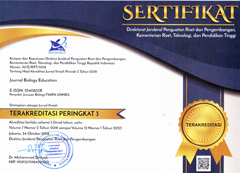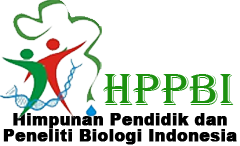The Effectiveness of Zero Waste Learning to Attitude and Commitment Zero Waste Lifestyle of Students Level 4 SMK Raja Permaisuri Bainun Malaysia as an Effort to Maintain Ecosystem
Abstract
The problem of plastic waste in the world is worsening until there is a leakage of plastic waste into the oceans that is adversely affecting ecosystems around the world. Zero Waste learning in students is one of the efforts that can help reduce plastic waste. The purpose of this study is to know the effectiveness of zero waste learning towards the attitude and commitment of zero waste lifestyle (ZWL) students level 4 smk Raja Permaisuri Bainun Malaysia. This research is quantitative research with Pre-experimental methods and research patterns by providing initial questionnaires to be filled out before being treated and filling out the final questionnaire after treatment. The population in this study was SMKRPB students with a sample of smkrpb level 4 students. Learning zero waste as an independent variable and its dependent variables is the attitude and commitment of the implementation of zero waste lifestyle of students in an effort to maintain the ecosystem. The initial data was taken before the study and the final data was taken after the study was collected with observation methods, questionnaires, and documentation analyzed and tested validity, normality, paired sample t-test and N-gain with SPSS 25. The results showed that zwl profile of students before lifestyle learning was implemented had moderate criteria for both aspects namely 41% for attitude aspect and 54% commitment, while the final profile after implementation of Zero Waste learning has very high criteria for both aspects which is 83% for attitude aspect and 89% commitment. T calculated value for attitude aspect 30,938, commitment aspect 8,819 so it is proven that there is a learning influence of Zero Waste in improving the attitude and commitment of Zero Waste Lifestyle students. the average N-gain score for the attitude aspect is 0.67, and the average value of the N-gain commitment aspect score of 0.69 belongs to the moderate category. Zero Waste learning effectively improves students' attitudes and commitments. Zero Waste learning can be done not only at level 4 because Zero Waste learning is effective in the classroom.
The copyright of the article once it is accepted for publication shall be assigned to the journal as the publisher. The intended copyright includes the right to publish the article in various forms (including reprints). The journal maintains the publishing rights to the published articles.
This work is licensed under a Creative Commons Attribution 4.0 International License.







